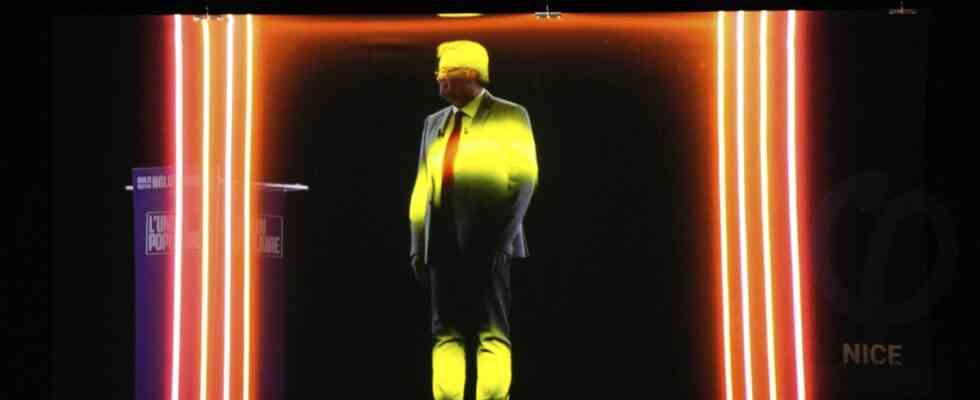And if everything turns out differently than predicted? With three days to go until the first round of France’s presidential election, Jean-Luc Mélenchon is far from giving up. Although no survey yet sees the 70-year-old reaching the run-off election on April 24, the trend for Mélenchon is clear: steadily and persistently upwards. In mid-March, the far-left candidate was at 12 percent in the polls, now it’s 16. That’s a good four percentage points less than second-placed Marine Le Pen, but Mélenchon gathered tens of thousands again this week for his campaign meetings.
In the 2017 election, Mélenchon narrowly failed to get into the runoff, receiving 19.6 percent of the vote. Then as now, he relied on a creative election campaign that was strongly tailored to his personality. On Tuesday, he recorded twelve cities simultaneously using hologram technology. As was the case five years ago, many of his supporters are young, committed leftists. Unlike in 2017, however, this time Mélenchon seems less like a pop star of the indignant and more like the faithful grandfather of the revolution. An image that his campaign team underlines by filming the graying Mélenchon with children and young people with particular frequency.
One thing is certain: his program is clear and coherent
Mélenchon had already declared his candidacy in November 2020, he was one of the first to present a worked out program. Even his opponents recognize that his policy bid is clear and coherent. Mélenchon sees himself as an anti-capitalist, the free market only brings “chaos” and must be replaced by a kind of ecological planned economy. Mélenchon’s election promises include the introduction of an additional week of vacation, pensions from the age of 60, a 100% switch to renewable energies and significantly higher taxes for higher earners. He is also the only candidate who promises the end of the presidential system and the creation of a sixth republic.
If Mélenchon were to succeed in moving into the runoff, it would shift the pre-runoff debates in a significantly different direction. The duel Emmanuel Macron versus Marine Le Pen would be based on juxtaposing a liberal draft of society against a nationalistic one. However, Macron would have to debate fundamental questions of redistribution with Mélenchon.
Mélenchon’s qualities include his undeniable talent for making big public appearances and his ideological determination. Which in turn often earns him compliments from his far-right competitor Éric Zemmour. Zemmour claims that Mélenchon, like himself, is “one of the last intellectuals” in French politics. Mélenchon got involved in this showdown by holding a TV debate with Zemmour back in September 2021, when he wasn’t even an official candidate.
At the same time, the obstacles to Mélenchon’s continued rise are numerous. Not least because other left-wing candidates refuse to join him. Neither the socialist Anne Hidalgo nor the green Yannick Jadot nor the communist Fabien Roussel will withdraw their candidatures for Mélenchon. While Mélenchon argues that he is the only leftist who can win, his competitors accuse him of his populism, verbal abuse and anti-European stance.
His uncompromising attitude has found supporters: the left-wing presidential candidate Jean-Luc Mélenchon this week in Lille.
(Photo: Michel Spingler/dpa)
In fact, social democrats, especially economically liberal social democrats of German stamp, are among Mélenchon’s clear favorite enemies. He began his political career in the Parti Socialiste in the 1970s, but left in 2008 during the financial crisis to protest austerity policies. Following the example of the left in Germany, he founded the “Parti de Gauche” and also invited Oskar Lafontaine to the founding congress. In 2016, Mélenchon founded his party “La France insoumise” (LFI), which still exists to this day. The party, like Macron’s La République en Marche, was conceived as a low-commitment online movement with a clear leader at its helm: Mélenchon. Mélenchon’s rhetoric makes it sound as if Macron and Le Pen are not just competitors, but two sides of the same coin. In 2017, before the run-off election, he had not asked his supporters to prevent Le Pen.
The Yellow Vests wanted nothing to do with Mélenchon’s people
During Macron’s tenure, Mélenchon’s LFI was represented in the National Assembly far more numerously than Marine Le Pen’s Rassemblement National and also pursued more offensive opposition policies (e.g. against the liberalization of the labor market). But the party has hardly had any electoral successes in the past five years. Above all, she failed to capitalize on the yellow vest movement’s resentment. The yellow vests took to the streets from November 2018, among other things, for more social justice and more direct democracy. Both core themes of Mélenchon. But the yellow vests mistrusted the LFI as well as the other political parties.
Mélenchon has also been criticized within the left for his foreign policy line. Mélenchon wants to leave NATO and possibly terminate the European treaties. Mélenchon documented his anti-German attitude, among other things, in his book “Der Bismarckhering”, with which he directed himself against Berlin’s stability policy in 2015. Green Yannick Jadot repeatedly attacked Mélenchon during the election campaign for his pro-Russia course. In January, Mélenchon said: “I’m convinced you can talk to the Russians quite normally.” Now he regularly condemns the attack on Ukraine.

